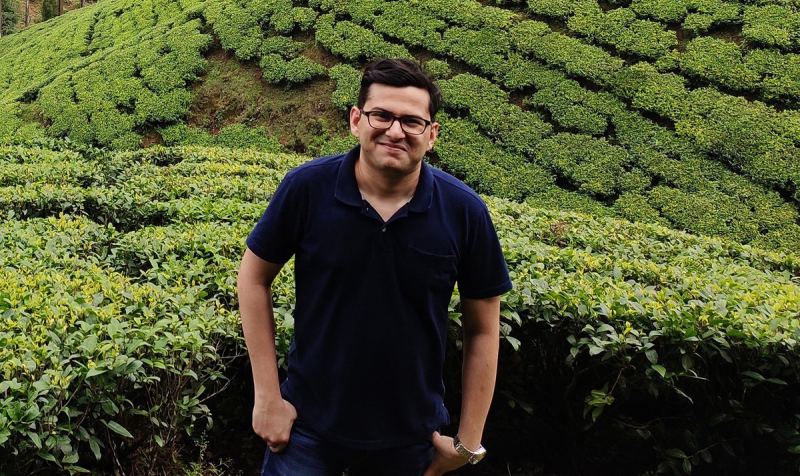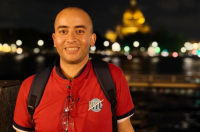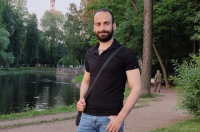Hello Sutanu, thanks for joining us today.
Greetings, everyone! It feels amazing to be here today.
Please introduce yourself to our readers.
My name is Sutanu and I am presently working as a research engineer in the field of wireless power transfer at the School of Physics and Engineering, ITMO University. My team is led by Prof. Polina Kapitanova and we developed Russia’s first wireless charging system for electric vehicles along with charging systems manufacturer Yablochkov some months ago.
Recently, I received the Russian Government Scholarship to pursue my PhD at ITMO, and I’ll be starting this September.
Tell us more about your role at ITMO.
My present role is that of a research engineer and my responsibilities involve running complex full-wave simulations of models that we want to develop. Simulations are essential in research as they help predict the behavior and the characteristics of the device that we want to build. This helps the team understand what to expect and how to make devices more attuned to our needs.
I am also involved in performing experiments, taking measurements, and in the construction processes in our labs. I also assist with microcontrollers and computer programming.
How did you get this role?
I have been wanting and trying to get this job since I was in my final year of my Masters's degree at LETI. When I came across the vacancy notice, I wasn’t qualified enough as I did not have a Master's degree. So, I had to wait for a year.
After the pandemic was over, this position became available again and I immediately contacted the HR department. After the interview and other necessary tasks, I got hired for this job.
Tell us more about the project that you are currently working on.
We are working on multiple projects at once, ranging from high-power wireless power transfer systems (10kW and above) to very low-power ones (1W and above). We are presently focusing on further research and development of our high-power wireless EV (electric vehicles – Ed.) charging system and assessing how it could be implemented in Russia and abroad.
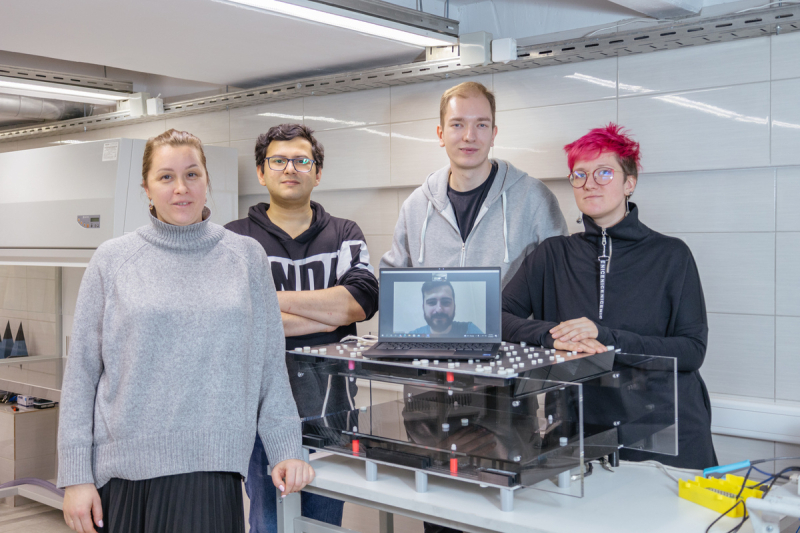
Sutanu with his colleagues at ITMO. Image provided by the School of Physics and Engineering, photo by Stepan Likhachev
Tell us something about your hometown.
I hail from Siliguri, which is one of the fastest developing cities in North Eastern India, located in the district of Darjeeling, which is home to the most coveted teas in the world. Apart from tea, my city has a vibrant atmosphere with people of mixed descent living harmoniously. It has the best momos in the entire world, in my opinion!
Siliguri also has comfortable winters and rich wildlife reserves. If you want to experience the humbling beauty of the green Himalayas and the unmatched hospitality of the friendly mountain folks, Siliguri is the place where you’d have to start.
What are some of the best places to visit in your country?
There are tons of places of interest in India. Even I haven’t visited most of them! There are places like the Taj Mahal which is definitely a must-see, but there are also several offbeat places scattered all over the country. For me, Sikkim is one of the best tourist destinations. Of course, there is Kashmir which is often referred to as “heaven on earth,” and I couldn’t agree any more. However, one must visit North Sikkim to witness another heaven on earth.
Do you have any favorite traditional foods from your country?
I have many! I am a big fan of Bengali and North Indian cuisine. My favorites are aloo posto, murgir lal jhol, and chicken rezala. North Indian dishes are also popular all over the world and my favorites are kebabs and biryanis, however, as a Bengali person, a potato in the biryani is a MUST.
How does it feel to be an expat in Russia?
I have no complaints. I have been working here for the past three years and have had to deal with the processes related to obtaining documents which many expats complain about. It is not easy, but if you are serious about your work and wish to settle down in Russia, it won’t really be a problem. The country needs these essential checks and verifications in order to ensure internal security and it is only natural that the processes are not simple.
What do you like the most about St. Petersburg?
Almost everything. I like how well-organized and stable this city is. It is no less than an open-air museum! The vibe in this city is second to none. To be very precise, I love how this city manages to balance its cultural elements with the technologically advanced systems for its dwellers.
How much Russian have you learned already?
A lot (I believe). My wife is Russian and she speaks English at the C1 level. She helped me immensely in learning this language. I have realized that it is much easier for the Hindi and Bengali-speaking folks to learn Russian since it belongs to the Indo-Aryan language family and there are a lot of similarities in words, grammar, and even pronunciation.
I am still trying to up my level and am actively involved in conversing with my colleagues and friends in Russian at ITMO.
Do you like Russian food? What are your favorite dishes?
Oh yes, I am a big fan of Russian cuisine! The meat-filled blinis are great for a sumptuous breakfast and the intricate salads that take a lot of preparation are a great side or even main dish! My absolute favorites are borscht (the one that my wife makes, fully traditional with her creative touches), and solyanka (this is the best hangover killer. Period! And it is also super tasty and nutritious). I am also a huge admirer of the classic Olivier salad but with smoked chicken. In terms of the main course, my favorite is Russian potato puree with beef goulash, beef stroganoff, and pelmeni.
If you are looking for snack options, I’d recommend the mighty Russian pierogies with ground meat and onion/cabbage fillings, hearty chebureki from a local cheburechnaya, and smoked cold cuts with Russian tap beer.
What do you like the most about Russian culture?
In Russia, there is no beating around the bush. I admire the unpretentious openness that people have for each other. You may have read and heard that the Russians don’t smile and aren’t friendly, and I’ve found exactly the opposite after living here for 4+ years. I have realized that Russian culture has no place for fake or pretentious behavior. If you need something, you ask straight away instead of trying to find ways of getting it. The worst you’ll get is a “No, I am sorry, I can’t do that.”
The Russian culture respects genuineness, family values, and the relationship people have with each other, vastly based on mutual respect. I love one specific similarity that Russian culture has with the culture I grew up witnessing, which is – they treat guests to a multitude of food and drink options and usually overfeed them, just like us Bengalis.
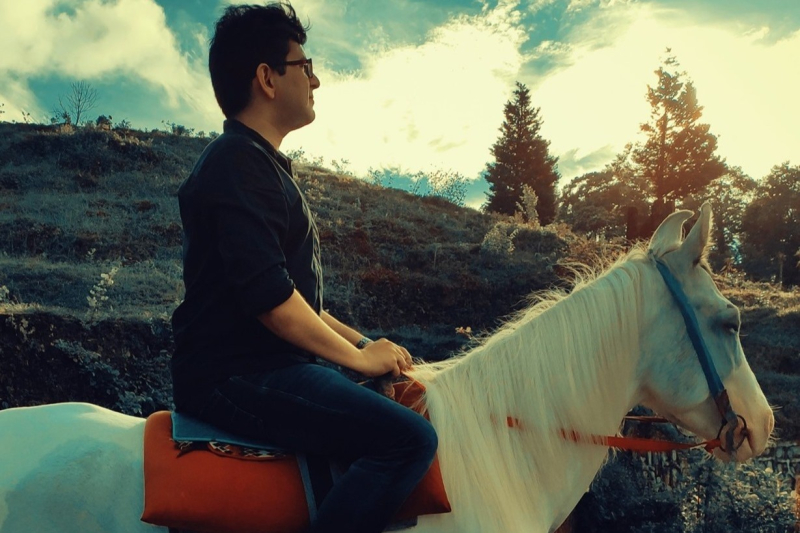
“On weekends, I love to go out for an adventure trip,” says Sutanu. Photo courtesy of the subject
Do you have a favorite restaurant to eat at in St. Petersburg?
It is definitely going to be My Asiatique! It is a straight walk from ITMO’s Lomonosova campus, where I work. They have complete meals for a decent price. They also have one of the best chefs in the city who knows how to conjure authentic Indian and South Asian dishes. It is a pan-Asian restaurant with multiple cuisines to choose from. They showcase true Indian hospitality and it is always a fantastic experience dining there.
What are your favorite places in St. Petersburg?
I really like the city center. It is always brimming with great food, cultural heritage, and social life. The great thing about working at ITMO is that you’re always only a few steps away from the most happening part of the city. Apart from the city center, there’s a lot to do on weekends, without spending a fortune. I especially love kayaking with my colleague turned friend in the River Vuoksa and Lake Ladoga, and also having a Russian-style picnic with a mangal (a Russian barbeque) where we grill marinated pieces of meat on a charcoal fire and take a swim in the clean lakes nearby.
Can you share one good and one bad experience in Russia?
The professionalism present in the corporate environment here is something that is commendable, especially at ITMO. The administrative staff at ITMO is extremely knowledgeable, efficient, and responsive.
The “spicy” sauces or “hot” condiments that you see advertised at the supermarkets aren’t spicy at all. If you are coming from India, Mexico, or any other country that has a time-tested and unbreakable love relationship with spicy and hot food, carry some red chili powder with proper heat levels. You can also get them online here and at some specific Asian stores. But the prices will be double or more.
How did you adjust to the cold weather here?
When I knew that I was going to be moving to Russia, I set my A/C to 16 degrees Celsius for an entire month. I also went to the Zero Point in North Sikkim and wore nothing but a hoodie. These are true events that probably helped me adjust, or perhaps just made me sick back there in India. Adjustment does take time, and the way you can accelerate your adaptation is by eating the kind of food that makes you warm. I also realized that wearing multiple layers of clothing helps.
What are your hobbies?
I used to be a professional guitarist in India (was taking a break and deciding what would be the right field), so right now as I am a professional in the field of Physics and Engineering playing the guitar still stays with me as a hobby. I also compose music and produce tracks in my free time. My other hobby is cooking and I cook almost every other day. I like experimenting with different cuisines and also like to fuse them together to find out what new tastes they can offer when combined.
Any advice that you would like to give to future ITMO students from your country?
My first advice is to talk to Indian expats and students who are already in Russia for quite a long time and learn firsthand how things work here. It would save them time and would be better than any website. As for me, I am ready to help anyone who requires information and advice.
Secondly, Russian is a beautiful language and it is worth learning if you decide to pursue your higher education in Russia. A lot of Indian students I talk to are unwilling to learn and later complain that they don’t get jobs here. Even a pre-intermediate level of Russian can be extremely helpful.
Thirdly, carry authentic Indian hot chili powder (and other spices you need to cook here) with you. It is of utmost importance.
